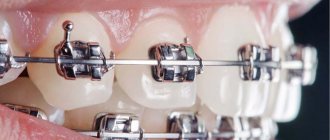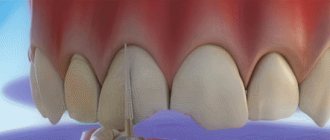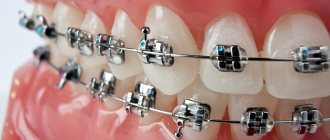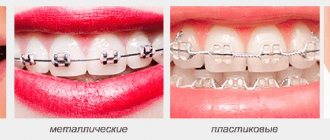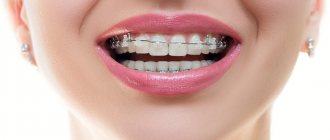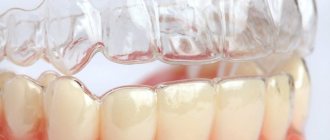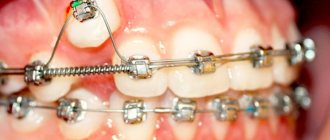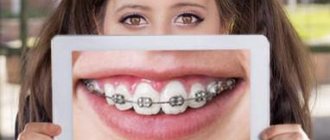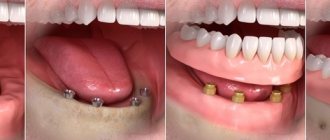- Non-ligature braces
- White braces
- Colorless braces
- Braces for adults
- Braces for children
- Upper jaw braces
- Braces for back teeth
- Braces for the lower jaw
- Braces for one jaw
- Braces for front teeth
- Braces for a teenager
- Vestibular braces
- Internal braces
- Pulling a tooth out of the gum with braces
- Iron braces
- Gold braces
- Ceramic braces
- Combined braces
- Composite braces
- Ligature braces
Installation of braces on teeth in dental clinics in Tula
- Dental salon homozovoy
- Soifera street, house 37A
- +7 (903) 659-… show all
- Mon-Sat 9:00–20:00
4.1 ratings: 12
- Dentistry sen-clinic
4.4 ratings: 14
- Zlotnikov and Poleteva
4.0 ratings: 4
- Durstom
3.9 ratings: 9
- 3d dentistry Novadent
4.0 ratings: 10
- Vita-dent
4.2 ratings: 10
- Dentistry at Pioneer
4.0 ratings: 4
What types of braces are there?
Our clinic uses several types of braces, which are selected individually: ligature, non-ligature and lingual.
Ligature and non-ligature braces differ in the method of attaching the arch:
- Ligatures. The metal arc is attached to the grooves of the locks using metal or silicone ligatures. With their help, the pressure force of the arc and the speed of alignment of the dentition are controlled. The presence of a ligature system makes the structure more noticeable; the patient has to visit the doctor quite often to replace the ligatures, but it is easier for the doctor to control the movement of the teeth and correct even complex occlusion pathologies, in addition, this is the most budgetary of all braces systems.
- Unligated. The arch is held in place by reliable spring latches or clips, which are already included in each bracket. This system is more expensive, but has greater aesthetics and allows you to visit the orthodontist much less frequently, since the teeth move gradually, with the same force applied.
Bracket systems also differ in the location of fixation:
- Vestibular. The classic method of attachment to the front side of the tooth. The design is noticeable when talking or smiling.
- Lingual. Fixation is made from the side of the tongue to the inner surface of the teeth. It is not noticeable at all, but at first it can affect diction.
There are metal and aesthetic (ceramic, sapphire, etc.) braces. Aesthetic dental braces justify the higher price with their beautiful appearance and are convenient for daily care. Our specialists will recommend installing exactly those braces that are best suited specifically for your case.
New reviews about the braces service in Tula
- And
Irina about the Ulybka clinic, October 31, 2021, 14:10 Going to the dentist was always torture until I fell into the hands of Eleonora Vladimirovna Afonina. A true master of his craft, an excellent specialist! No pain or fear. She solved all my dental problems, and at an affordable price...
Popular clinics
Dentistry sen-clinic Timiryazeva street, building 97 +74.4 ratings: 14
3d dentistry Novadent Demonstration street, building 1G +7, +7 (4872) 57-09-804.0 ratings: 10
What are braces and how do they work?
Straightening teeth with braces is not a new, but quite effective method. This is a complex system of locks/brackets on the teeth, which moves them in the desired direction and places them in the correct position relative to their neighbors. The price of braces in Tula depends on the complexity of the maxillofacial anomaly.
It can be:
+ Anomalies in the shape and location of teeth (rotation along the axis, displacement in some direction);
+ Anomalies of the dentition (absence of teeth and their rudiments, formation of supernumerary teeth, violation of the distance between teeth, underdevelopment or excessive growth of the alveolar process, narrowing or expansion of the dentition);
+ Anomalies in the relationship of the dentition (underdevelopment or overdevelopment of the jaws, open bite, when the teeth do not close in the anterior section, deep traumatic, when the gum mucosa in the anterior section suffers, etc.).
Maxillofacial anomalies can be congenital or acquired: as a result of bad habits (for example, thumb sucking), previous diseases, injuries, early tooth extraction. That is why it is important to see an orthodontist in time to stop the formation of pathology.
The ability to move teeth continues throughout a person’s life. The optimal age for eliminating dental defects with braces is adolescence, but our doctors show excellent results when treating patients even after 30–35 years. The average period of wearing braces and the price depend on many factors and range from 8 months to 3 years.
Braces for the upper or lower jaw are non-removable orthodontic structures. Miniature clasps are attached to the teeth with a special dental material (composite) and connected into a single system using a metal arch-bracket. It does the main “work” of moving teeth by creating a certain pressure, turning them due to stretching of the ligaments.
Fresh questions about the braces service in Tula
- And
Anna asks the Durstom clinic a question, November 21, 19:00 Hello, do you remove teeth under sedation? - N
Natalya asks a question to the Zlotnikov and Poletaeva clinic, March 26, 14:17 Hello. Is it possible to remove ceramic-metal bridges without damaging them?
- N
Natalia asks a question to the clinic Dentistry sen-clinic, March 26, 14:16 Hello. Is it possible to remove ceramic-metal bridges without damaging them?
- ABOUT
Olga asks a question to the clinic Center for Dentistry of Innovative Technologies named after Tikhonov and E, March 24, 11:58 Hello, I have been a client of your dental clinic for a long time. I am interested in tooth extraction under general anesthesia. Do you have a similar method of removal, its price and preparation for the process, there may be contraindications. Thank you …
How to install braces
- Installation of a mouth opener. With its help, all teeth become clearly visible, even to the most distant and hard-to-reach areas.
- Polishing the enamel and applying a restorative composition to it.
- System installation. Braces are attached to the teeth using a special glue that is applied to the enamel. Orthodontic cement is applied to each lock, which hardens under the influence of ultraviolet rays.
More services in the direction of braces in Tula
- Lingual braces
- Metal braces
- Mini braces
- Bite braces
- Invisible braces
- Orthopedic braces
- Plastic braces
- Clear braces
- Simple braces
- Multi-colored braces
- Jaw expansion with braces
- Retainers
- Self-ligating braces
- Sapphire braces
- Silicone braces
- Hidden braces
- Removing braces
- Removable braces
- Titanium braces
- Colored braces
- Partial bracket system
- Aesthetic braces
Braces in Tula - phone numbers of registries, websites and addresses of clinics, customer reviews and ratings of centers for pediatric, adult and family dentistry. Opening hours of clinics, questions and answers, photo and video presentations. Prices for the service of installing braces.
Types of bracket systems
Designs for correcting malocclusion can be of several types. Which one to use is determined by the doctor in accordance with the identified problem. In general, all braces are classified according to a number of criteria.
By location:
- lingual (installed on the inner side of the dentition);
- vestibular (installed on the outside of the teeth).
According to the material of manufacture:
- metal;
- polymer;
- sapphire;
- plastic combined (from several types of material).
According to the method of connecting the arc and plates:
- classic;
- non-ligated.
Braces and bracket systems
In order to correct dental malocclusion, orthodontists invented braces. These are devices that resemble locks that can gradually guide the dentition, thus correcting the bite. Braces are secured to the inner or outer surface of the tooth with a special material. A memory arch is installed in the grooves of the braces and from this moment the process of correcting the dentition begins. The arc plays a major role in this process. It puts pressure on the teeth, causing them to move in the desired direction.
Installation of bracket systems
Children under 13 years old have their bite adjusted using removable equipment, since their dental system is still mobile and unformed. To correct a child's bite, plates and trays are enough. For a mature teenage and adult bite, these measures are not enough. Without permanent braces, treatment will be ineffective. Braces are installed in the following cases:
- Trema and diastema - the presence of spaces between teeth;
- Incorrect tooth eruption, when there is a need to pull out the tooth;
- The need to move a tooth arises, as well as due to tooth loss.
Wearing braces
The period of wearing braces depends on the state of the dentition and ranges from one to three years. Typically, braces are worn for one and a half years, constantly consulting with your doctor. To consolidate the treatment results, the doctor prescribes wearing removable plates. You should not be upset about the length of treatment. After this, your teeth will delight you with their beauty, and you will be able to give a smile to your family and friends.
Types of braces
Braces are available in sapphire, ceramic, metal and lingual. Ceramic braces are very popular for correcting dental malocclusion. Lingual ones are good because they are invisible in the mouth, as they are located on the inside of the tooth. But lingual systems never gained much popularity due to their high cost. If you need to maintain a beautiful smile, then you can install sapphire braces. In terms of design, they are no different from ceramic ones. They differ only in the locks, which are made of transparent materials and are not so striking at first glance.
Cost of braces
The cost of a brace directly depends on its type. The price list of our dental clinic will familiarize you with the prices for types of braces. You can also find out the cost of services by calling the phone number indicated above.
How are aligners installed?
At the first visit, the dentists of our clinic carry out the necessary diagnostic procedures, identify problem areas and determine the presence or absence of contraindications to treatment with aligners. In the absence of contraindications, doctors take high-precision impressions and cast plaster models of the jaws, which become the basis for future aligners. Diagnostic models are sent to the laboratory, where a computer simulation of a given clinical case is carried out and a 3D computer forecast of the upcoming treatment is carried out; using a special program, the required number of aligners to correct the bite and the final result of the treatment are calculated, which the doctor will then show you on the computer screen. The number of replacement aligners needed to correct the bite determines the price of treatment. After the 3D prognosis is approved with the patient, an individual set of transparent aligners is manufactured in the laboratory. In Tula, we work with the Star-Smile company, which allows us to produce structures of excellent quality in a modern laboratory using advanced technologies. .
At the next visit, the dentist arranges special composite activator points on several teeth, through which the aligners transmit their pressure, carefully puts the aligner on the teeth, and checks the tightness of the fit and the effect on the patient’s jaw. Activators are not visible on the teeth, and after treatment the doctor simply removes them. The patient learns how to put on and take off the mouthguard independently. The procedure for installing aligners in Tula takes no more than an hour, does not require the use of anesthesia, the frequency of further examinations is determined by the doctor individually (as a rule, no more than once a month).
Despite the relatively high price, this method of correcting a bite is comfortable for a person and shows excellent results after just a few months of active use of the mouthguard.
